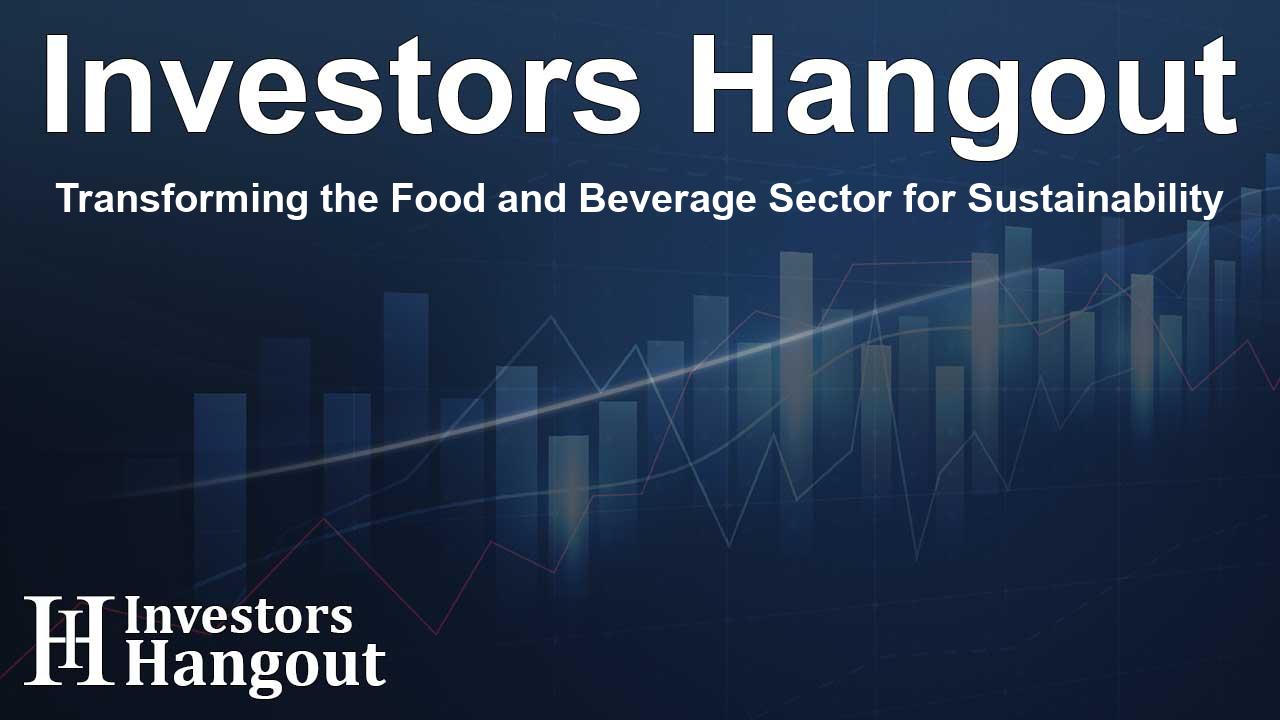Transforming the Food and Beverage Sector for Sustainability

Transforming the Food and Beverage Sector for Sustainability
The food and beverage industry is at a pivotal moment, facing significant pressures related to sustainability and the need to adapt to new market demands. As global challenges such as climate change and evolving consumer expectations intensify, the industry must rethink its supply chain strategies to foster sustainability.
Global Challenges and the Need for Change
Recent studies indicate a growing awareness among food and beverage companies about the importance of sustainable practices. More than three-quarters of these companies identify sustainability as a top priority. This shift is a response to the urgent calls for change across the globe, driven by both regulatory frameworks and shifts in consumer preferences.
Key Drivers of Industry Transformation
One of the main factors pushing for change in the food and beverage sector is the growing length of supply chains. The complexity of these networks means they contribute significantly to carbon emissions. It's estimated that food systems account for approximately one-third of global emissions, necessitating immediate action from all stakeholders. Businesses must adopt innovative strategies to curtail their carbon footprints while ensuring compliance with new regulations.
Digital Transformation: A Catalyst for Sustainability
Digital transformation is emerging as a crucial strategy for improving sustainability in the sector. Companies are increasingly investing in digital tools that facilitate greater supply chain traceability and enhance transparency among all players involved. These technologies can mitigate risks and improve compliance, but many organizations still face challenges integrating them effectively into their operations.
Consumer Expectations and Engagement
Today's consumers are better informed and more conscious of their choices, driving demand for sustainable practices in food production. They are willing to pay a premium for products that align with their values, placing additional pressure on retailers and suppliers to adopt comprehensive sustainability measures. Retailers, particularly those with private labels, are crucial in fostering collaboration between manufacturers and suppliers to meet these heightened expectations.
A Blueprint for Success
As sustainability becomes a precondition for success in this sector, companies are encouraged to take a holistic approach that encompasses not just environmental responsibility but also cost efficiency and regulatory compliance. Organizations must embrace emerging technologies and prioritize detailed data collection methodologies to support their sustainability goals. The transition towards sustainable practices will not only enhance their market position but also foster long-term relationships with consumers who prioritize transparency and accountability.
Beyond the Immediate Challenges
It’s essential for the food and beverage industry to remain agile in response to global disruptions such as pandemics and geopolitical tensions. The ongoing impacts of climate change further complicate the operational landscape, making it more critical than ever for businesses to strategize around sustainability. The integration of AI and advanced analytics holds great promise for improving traceability and visibility across supply chains.
Conclusion
In conclusion, the future of the food and beverage industry hinges on a commitment to sustainability. Companies must embrace innovation and collaboration at all levels within their supply chains to adapt to both current and future challenges. By doing so, they can ensure they are well-positioned to thrive in an evolving marketplace focused on sustainable and responsible practices.
About DNV
DNV is recognized as a leading independent assurance and risk management provider. Operating in over 100 countries, DNV utilizes its expertise to help companies improve trust and transparency in their supply chains. With a commitment to sustainability, DNV is focused on guiding organizations toward their strategic goal of managing risks effectively, improving ESG performance, and achieving sustainable results.
Frequently Asked Questions
What are the main challenges facing the food and beverage sector?
The food and beverage sector faces several challenges, including the need to reduce carbon emissions, meet evolving regulations, and adapt to consumer demands for sustainability.
How is digital transformation impacting the industry?
Digital transformation provides tools for better traceability and transparency within supply chains, enabling companies to manage risks more effectively and comply with sustainability requirements.
Why is consumer demand important for sustainability efforts?
Consumer demand influences businesses to adopt more sustainable practices as informed consumers are willing to pay a premium for products that align with their values.
What role do regulations play in the food and beverage industry?
Recent regulations are designed to compel businesses to adopt comprehensive sustainability practices, addressing issues from carbon emissions to human rights.
What is the future outlook for sustainable practices in the sector?
The future of the food and beverage sector will likely see greater emphasis on sustainability, driven by consumer expectations, regulatory requirements, and the need for businesses to adapt to changing environmental conditions.
About The Author
Contact Caleb Price privately here. Or send an email with ATTN: Caleb Price as the subject to contact@investorshangout.com.
About Investors Hangout
Investors Hangout is a leading online stock forum for financial discussion and learning, offering a wide range of free tools and resources. It draws in traders of all levels, who exchange market knowledge, investigate trading tactics, and keep an eye on industry developments in real time. Featuring financial articles, stock message boards, quotes, charts, company profiles, and live news updates. Through cooperative learning and a wealth of informational resources, it helps users from novices creating their first portfolios to experts honing their techniques. Join Investors Hangout today: https://investorshangout.com/
The content of this article is based on factual, publicly available information and does not represent legal, financial, or investment advice. Investors Hangout does not offer financial advice, and the author is not a licensed financial advisor. Consult a qualified advisor before making any financial or investment decisions based on this article. This article should not be considered advice to purchase, sell, or hold any securities or other investments. If any of the material provided here is inaccurate, please contact us for corrections.
